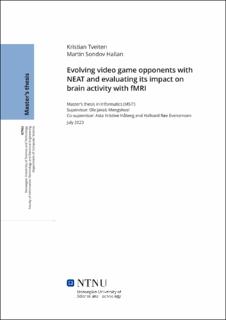| dc.contributor.advisor | Mengshoel, Ole Jakob | |
| dc.contributor.advisor | Håberg, Asta Kristine | |
| dc.contributor.advisor | Evensmoen, Hallvard Røe | |
| dc.contributor.author | Tveiten, Kristian | |
| dc.contributor.author | Hallan, Martin Sondov | |
| dc.date.accessioned | 2023-11-04T18:20:01Z | |
| dc.date.available | 2023-11-04T18:20:01Z | |
| dc.date.issued | 2023 | |
| dc.identifier | no.ntnu:inspera:145904930:36153403 | |
| dc.identifier.uri | https://hdl.handle.net/11250/3100616 | |
| dc.description.abstract | Neuroevolusjon, spesielt Neuroevolution of Augmenting Topologies (NEAT), har lovende potensial innen videospill for utvikling av dynamiske og engasjerende kunstige motstandere. Dens innvirkning på spill-opplevelsen ble undersøkt ved bruk av funksjonell magnetresonansavbildning (fMRI), for å analysere hjernens aktivitet hos 13 deltakere i alderen 21 til 26 år (med en gjennomsnittlig selvrapportert spillerfaring på 3,76/5) mens de spilte et dodgeball-videospill. Deltakerne spilte mot tre forskjellige motstandere: en utviklet med NEAT, en annen implementert som en tradisjonell Finite State Machine (FSM), og den siste trent via Multi-Agent Posthumous Credit Assignment (MA-POCA). Den selvrapporterte-, spill- og fMRI-dataen viste trendende og signifikante forskjeller mellom alle agentene, i tillegg til økt aktivering i hjerneregionene amygdala og nucleus accumbens under spill mot agenten utviklet med NEAT sammenlignet med de andre agentene. Disse hjerneområdene er vanligvis forbundet med følelsesprosessering, læring og belønningsprosessering. Videre fremhevet den selvrapporterte dataen gjennom spørreskjemaer og spill-dataen den forbedrede spillopplevelsen mot NEAT-agenten når det gjaldt deltakerene sin tilbakemelding på metrikkene 'unik strategi', 'balansert utfordring', 'mestringsfølelse', 'frustrasjon' og 'underholdningsverdi'. Agenten utviklet med NEAT overgikk også de andre agentene når det gjaldt metrikker som antyder en høyere tilstand av 'flow' for deltakerne. Funnene i atferds- og nevrologiske dataene antyder at bruk av neuroevolusjon under utviklingen av spill-motstandere betydelig forbedrer opplevelsen av spiller-mot-agent spill. | |
| dc.description.abstract | Neuroevolution, spesifically Neuroevolution of Augmenting Topologies (NEAT), offers promising potential in the realm of video games towards evolving dynamic and engaging artificial opponents. Its impact on the gaming experience was investigated by utilizing Functional Magnetic Resonance Imaging (fMRI), to analyze the brain activity of 13 participants aged 21 to 26 (With an average self-rated gaming experience of 3.76/5) while playing a dodgeball video game. The participants played against three different opponents: one evolved with NEAT, another implemented as a traditional Finite State Machine (FSM), and the last one trained via Multi-Agent Posthumous Credit Assignment (MA-POCA). The self-reported, game performance and fMRI data revealed trending and significant differences between all the agents, in addition to elevated activation in brain regions amygdala and nucleus accumbens during play against the agent evolved with NEAT, when compared to the other agents. These brain regions are commonly associated with emotion processing, learning and reward processing. Furthermore, self-reported data through questionnaires and game performance data highlighted the elevated game experience against the NEAT agent in terms of rated 'unique strategy', 'balanced challenge', 'sense of mastery', 'frustration', and 'entertainment value'. The opponent evolved with NEAT also outperforms the other opponents in terms of metrics suggesting a elevated state of flow for participants. The findings in behavioral and neurological data suggest that implementing neuroevolution in the development of in-game opponents significantly enhances the experience of player-versus-agent gaming. | |
| dc.language | eng | |
| dc.publisher | NTNU | |
| dc.title | Evolving video game opponents with NEAT and evaluating its impact on brain activity with fMRI | |
| dc.type | Master thesis | |
